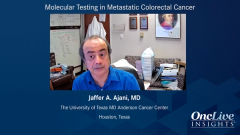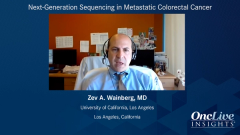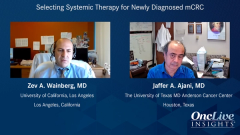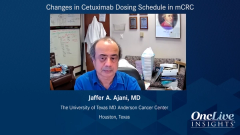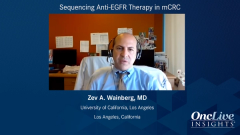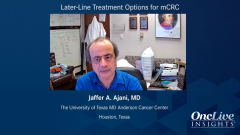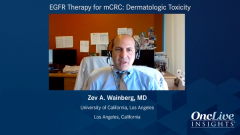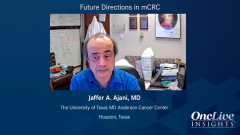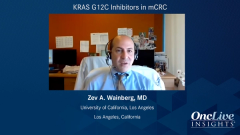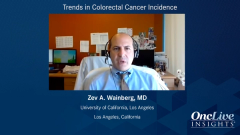
Supplements and Featured Publications
- My Treatment Approach: Colorectal Cancer
- Volume 1
- Issue 1
KRAS G12C Inhibitors in mCRC
A brief discussion regarding current data and interest in treating appropriate patients with metastatic colorectal cancer with potent KRAS G12C selective inhibitors.
Episodes in this series

Zev A. Wainberg, MD: Just to wrap up, everybody talks about KRAS G12C. That’s a RAS mutation too, which we don’t use an EGFR inhibitor for. Until 2 or 3 years ago, we didn’t even know it was G12C, but now we clump them all in with KRAS. Now we have potent drugs, selective KRAS G12C inhibitors that are effective. These drugs in colon cancer don’t have a lot of single-agent activity in my view. They have stable disease, a few responses, not like in lung cancer—which isn’t a big surprise, I suppose. What’s interesting is that there was a study published 6 months ago or so in Cancer Discovery. It suggested that 1 of the elements of resistance mechanisms to KRASG12C inhibitors in colon cancer was EGFR upregulation. There’s this surge of interest in looking at FGFR combinations withKRASG12C inhibitors, particularly in that group, which is only 4% or so of metastatic colon cancer. What do you think about combining these 2 elements of drugs together in select patients?
Jaffer Ajani, MD: That’s very important and interesting. You remember the BRAF story in melanoma and in colon cancers and in melanoma if your BRAF inhibitors are very active. That’s because the EGFR is buried in the DNA, it cannot be transcribed. But in colon cancer, EGFR is a resistant mechanism. If you inhibit BRAF, EGFR takes over. But if you inhibit both, then you can get an advantage. Even for KRAS, all these loops have to be closed because the survival circuitry is just fascinatingly fantastic.
Zev A. Wainberg, MD: It’s a very similar paradigm to what we saw in BRAF and similar to lung cancer in which kinase inhibitors have the ability to work a lot more effectively if single agents. But in diseases like colon cancer, where there’s more bypass, perhaps mechanisms of resistance, the concept of oncogene addiction isn’t as clear. We need 2 drugs, and there are already big trials being planned to combine these KRAS G12C inhibitors with EGFR inhibitors—even registrational trials. The field is moving fast in that regard, and that’s 1 of the things I’m looking forward to seeing. There are other KRAS isoforms, which we may very well have drugs for in the next few years too. Some of those things really excite me, Jaffer. We’ve got to keep busy in the world of drug development in these diseases to improve outcomes for our patients. Thank you very much for taking time in your schedule to join us today.
Jaffer Ajani, MD: It was very enjoyable. Thank you.
Transcript Edited for Clarity
Articles in this issue
over 4 years ago
Anti-EGFR/Chemo Combos Allow for Tailored Approach in mCRCover 4 years ago
Biweekly Cetuximab Offers a Convenient Dosing Option in mCRCover 4 years ago
Genomics, Sidedness Guide Treatment Selection in Metastatic CRCover 4 years ago
Future Directions in mCRCover 4 years ago
EGFR Therapy for mCRC: Dermatologic Toxicityover 4 years ago
Later-Line Treatment Options for mCRCover 4 years ago
Sequencing Anti-EGFR Therapy in mCRCover 4 years ago
Changes in Cetuximab Dosing Schedule in mCRCover 4 years ago
Selecting Systemic Therapy for Newly Diagnosed mCRC

